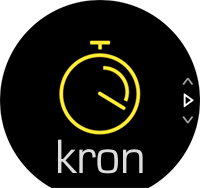
What is Kron?
Kron is a reset-able Timers manager offering 4 modes through a unified api. Kron takes care of the involved implementation of reset-able Timers while ensuring a proper memory management with no extra effort:
Kron.debounce: Calls immediatly and reject calls until time out elapsesKron.debounceLast: Asdebouncebut also performs the last call after time outKron.idle: Performs the last call after not being called during the timeout intervalKron.watchdog: Asidlebut allowing to be canceled withwatchDogCancel
CocoaPods
If you use CocoaPods to manage your dependencies, simply add
Kron to your Podfile:
pod 'Delayed', '> 2.2.2'
And then import the module
import Delayed
Why Kron?
Creating a reset-able Timer requires a setup similar to this:
class SomeClass{
var timer:Timer?
/// create timer
func createTimer(){
assert( timer == nil, "Please call cancelTimer first" )
timer = Timer(timeInterval: TimeInterval(1.0), target: self, selector: #selector(timerTick), userInfo: nil, repeats: false)
RunLoop.main.add(timer!, forMode: .commonModes)
}
// cancel timer
func cancelTimer(){
if let aTimer = timer {
aTimer.invalidate()
}
timer = nil
}
// restart timer
func restartTimer(){
cancelTimer()
createTimer()
}
/// handle callback
@objc func timerTick(_ timer:Timer){
timer.invalidate()
//Do something
}
}
What about doing this in one line?
Kron takes care of all this setup by internally managing a map of Timers that can be accesed through a resetKey. Recursively calling with the same resetKey will cause that particular timer to reset in all modes.
Kron.idle(timeOut:1.0, resetKey:"updateUI"){ (key,context) in
}
So the main difference are
Instead of returning a
Timerinstance, Kron manages the Timers internally through a [KronKey:Timer] dictionary. This makes easy to call Kron from distant components or threads accesing the timers by their key value and in a single line.The
KronKeycan be etiher aStringstruct orAnyObjectinstance. If an object is passed the key is inferred from the object’s pointer. Calling the methods with the same key causes all timer modes to be reset.An optional
contextofAny?type can be provided and it’s internally wrapped with a weak reference to prevent retain cycles. The context is then optionally passed to thetimeOutclosure.
Practical Applications
Debounce Scroll
This example will ensure to update the UI only every second during user scroll. Additionally using debounceLast will ensure to apply the last call on timeOut. This will guarante the last event will be performed. (You cn alsu use debounce for traditional debouncing.
func didScroll(){
Kron.debounceLast(timeOut: 1, resetKey: "scroll") { (keu, context) in
//updateUI
}
}
Idleand Ensure Context
This example will save a document only if the user hasn’t typed in 5 seconds. In the timeOut closure we check that the KronKey is equal to the currentDocumet otherwise we abort the save action.
var currentDocument:NSObject;
func textViewDidChange(){
autoSave()
}
func autoSave(){
Kron.idle(timeOut:10.0, resetKey:self.currentDocument){ [weak self] (key,context) in
let aDocument = key as? NSObject
guard aDocument == self?.currentDocument else{
return
}
self?.saveNow()
}
}
func saveNow(){
//save only if current document is still active
}
Watchdog
The following example shows how to add a watchdog for different Api Requests.
func startApiRequest(_ endPointURL:String){
let watchdogkey = "ApiRequest\(endPointURL)"
Kron.watchDog(timeOut:10.0, resetKey:watchdogkey){ (key,context) in
// retry or something else?
assert(false, "print api is not responding!")
}
SomeClass.loadApi(endPointURL){
Kron.watchDogCancel(watchdogkey)
}
}
Documentation
Self-generated documentation using jazzy and hosted in github available here:
Gists
Please review the test units for exhaustive implementation samples.
In all instances the timer will be reset by simply calling Kron with the same key. (See below Static vs Instance to learn more about the Static keyspace).
- Idle Timer
Kron.idle(timeOut:1.0, resetKey:"keyStrokes"){ (key,context) in
print("performed after 1 second of inactivity")
}
- Debouncer
Kron.debounce(timeOut:1.0, resetKey:"Scroll"){ (key,context) in
print("performed immediately and again no sooner than 1 second")
}
- Debouncer and perform last
Kron.debounceLast(timeOut:1.0, resetKey:"Scroll"){ (key,context) in
print("performed immediately and again no sooner than 1 second")
print("also performs the last call after 1 second of inactivity")
}
- Watchdog
Kron.watchdog(timeOut:10.0, resetKey:"ApiResponse"){ (key,context) in
print("performed after 10 seconds unless canceled")
}
...
// Called somewhere else to abort the timeOut
Kron.watchdogCancel("ApiResponse")
Satic vs Instance
You can use the provided static functions. Internally Kron manages 4 singletons to prevent key collisions between the different modes:
//Debouncer
Kron.debounce
//Debouncing Last
Kron.debounceLast
//Idle
Kron.idle
//Watchdog
Kron.watchdog
Optionally you can instantiate Kron to manage your own keyspace in that given intance.
let myKron = Kron()
myKron( ...
Have a question?
If you need any help, please visit our GitHub issues. Feel free to file an issue if you do not manage to find any solution from the archives.
You can also reach us at:
eonfluxor@gmail.com
About
Kron was originally built by Hassan Uriostegui as an objective-C framework. It’s now released as a swift open source framework under the Eonflux collective. Check our other projects and join our eon flux of innovaton !
 View on GitHub
View on GitHub
 Reference
Reference



